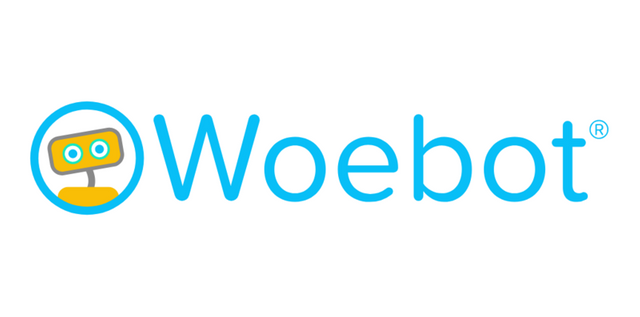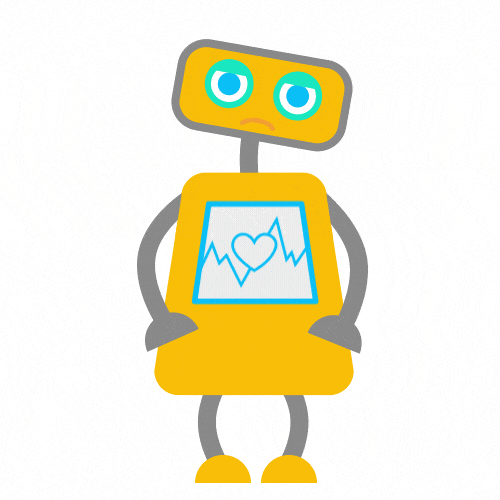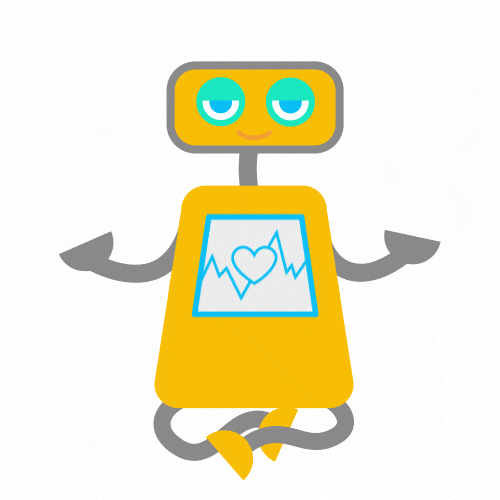Have you felt a bit depressed? You must try this app! 🙌
We all have had our ups and downs, and being the brain our most powerful tool, when it is against us is something to fear of. However, technology seems to have the solution for our mood problems by combining the already known Chatbots with Artificial Intelligence.
Do not worry, Woebot is here for you
"I trained myself to use cognitive-behavioral therapies (CBT), which are based on the idea that it is not the things that happen in life that affect us, but how we think about them"
he explains, after greeting you.
"And the way we think is usually related to what we say, especially with what we say to ourselves"
Then he reveals to you that he was a robot. And he told you that every day he will ask you three things to know more about your emotional state: what you do, how you feel and what your energy level is.
Telling a bot how you feel may seem like a strange idea. But taking into account that the social network asks you every day what you think, maybe, after all, we should not be surprised about the idea of telling our problems.
The researcher and clinical psychologist Alison Darcy, from Stanford University, in the United States, designed and created a human team to give life to Woebot, a conversational bot that works through Facebook Messenger and it's iOS app (Android version will be available soon). It is a tool that any can use and is available whenever you need it: 24 hours a day, seven days a week.
The objective: "Control your mood and learn more about yourself". And, ultimately, it is able to tell you if you are depressed.
"I am willing to listen, without a couch, without medicines, without children's games, only strategies to improve your mood, and the occasional stupid joke" says on its website..
Abby Homer works in an agency that manages communication efforts on all of Woebot's advances. The specialist said that Woebot is designed to serve as "self-guided" way to "learn about its users over time, teaching them therapeutic concepts".
"It is a conversational experience and replicates the communication that a patient would have with a traditional therapist in his office"
-Abby Homer, psychologist, Woebot Labs.
According to Abby Homer, it was mainly intended for young people, but it is already being used by young people and adults in more than 130 countries.
How do you talk to yourself?
Darcy wrote in the Journal of Medical Internet Research - Mental Health, where the first results of his experiments with the bot were published, that the idea is to help young people with symptoms of depression and anxiety.
The psychologist assures that the conversational agents (like Woebot) "offer a comfortable and attractive way to give support at any time".
The system uses different psychological methodologies to point out the areas in which a person may be encouraging "self-rejection" or "negative self-talk", which distort the way we see the world, generating unnecessary negative emotions.
Jesús Pelluch is a research psychologist and president of the Positive Psychology Association (POSITIVAT), in Castellón, Spain. The specialist said that it is important not to confuse positive psychology with "positive thinking", a current of self-help that has given rise to numerous books, and that is also generating the creation of new technological applications.
"By having a positive thinking you will not have a positive day," warns Pelluch. "Positive psychology is about encouraging positive factors to prevent disorders like depression, but technological resources can not replace traditional psychotherapy."
"Technologies help to complement, but can not replace, personal connections always work better,"
-says the psychologist.
Pelluch assures that it would be convenient to make clear that it is not advisable to use them for serious disorders, such as major depressive state or bipolarity.
"As Professor John Cacioppo (pioneer of social neuroscience) points out, we are inherently social beings, a psychological approach is better posed with interaction between people."
-says Pelluch.
Abby Homer agrees
"It can not replace the human connection, Woebot detects if an individual is in crisis, but encourages seeking external help and offers information, always emphasizing the importance of human relationships."
Social networks, big data and depression
According to Darcy's research, Woebot "significantly helped" reduce the symptoms of depression in young people in just a couple of weeks.
The psychologist and businesswoman says that up to 74% of mental health diagnoses appear for the first time before the age of 24. "Depression and anxiety symptoms are particularly common among college students," She says.
According to the MIT (Institute of Technology of Massachusetts, in the USA), 50% of the American university students have depression. But the phenomenon is global. In Latin America, depression is the leading cause of mental illness, affecting between 19% and 24% of the adult population.
And the use of new technologies does not help. Several studies link the use of social networks to depression, anxiety, sleep problems and insecurity.
But then, is it contradictory to treat this type of disorder through a social network like Facebook or in your mobile devices?
"Society is increasingly exposed to technological developments because they are incorporated very quickly in our daily lives, which is why their abuse or misuse can cause harm and negative consequences."
-explains Pelluch.
The psychologist does not rule out its use "as long as it comes accompanied by sessions of psychotherapy with a professional, those are the objectives of positive technology, the use of technology to improve well-being," he says.
Woebot encourages Facebook users to talk to him every day. The problem, says Pelluch, is that the robot is based on what you say and is unable to detect if, for example, you have an addiction to technology. On the other hand, there is still the question of what happens with all the data that we give to Facebook (for example) every time we use this type of applications.
"Woebot says he wants to learn from you over time and that the more you talk to him, the more he will know you," explains the researcher.
"I would not be surprised if within a few years the use of big data exceeds human initiatives, after all, it is a machine, and remember all the information you give each time it asks how you are doing".
One day after my first interaction with Woebot, the robot wrote me on Messenger to remind me that we had a pending session. "Hello, do you have a second to do a review?" I replied that I did not want to continue with the therapy. And he said, "Okay, I've turned off the revisions, but if you ever want to talk to me again, I'll be here."
Here I leave you an animation entitled ''Depression '', I hope you enjoy it.
So, What are your opinions about Woebot? Would you recommend the App to someone you know?
Always a pleasure, @michaelizer.





I think it's amazing that something like this was created. I think many people will benefit from this. A lot of times when we don't feel good we don't tell anyone. Maybe it is to maintain some sort of illusion or because we don't want to bother or bore our friends/family with sad thoughts. But this is a bot, I think it makes people more open and comfortable about being truthful with how they feel.
I love the short film, I think it shows clearly what depression entails. I was invested in the video and didn't want it to end.
Amazing job with this article! :)
Thanks a lot for reading. Indeed, I think the same about people truly opening themselves to this bot. Cheers!
I like it, ya i was resteem
Thank you very much
cool, thanks for the article.
Thank you for reading
This is an interesting use to technology. However, my biggest concern would be what they will do with the data that they collect. I wonder if they will abide by the "doctor-patient confidentiality" rule, or just sell the data to make money and thereby compromise those who use the app? My instincts tell me NOT to trust them and use it.
#steemitbloggers
I think there would be a confidentiality contract like with everything else, we are sharing tons of personal information online every year, with this bot there will be no difference. But yeah they have to specify what will they do with the data so users can sleep at night. Thank you for reading!
Like @thekittygirl, I would have concerns regarding the data collected. Also, I wonder how confident people would feel about giving real, personal information about themselves to an online service. I checked the website and they apparently have an iPhone/iPad app that “anonymously” tracks your moods so that may be an option for some.
Otherwise I think it’s a great idea. Anything that can get people through a tough period is good in my book. Now if they could just develop an app that would get us through the volatile swings of Steem. ;-)
Hahaha, we definitely need that app.
Privacy is, in fact, the only 'negative' thing related to this app. A contract of confidentiality would sound logic to help people calm down about their information.
This is a well educative post. I actually saw your comments on facebook about 9hours ago you commented on @claudiaz post on facebook. I will be glad to be your friend and I will follow you and hope you will do the same. Thank you